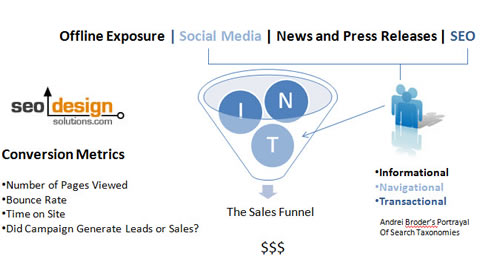What happens if you target the wrong keywords, consumers or rely on a narrow traffic source instead of diversifying your website across multiple traffic sources? The answer, failure to grasp the true premise of internet marketing.
Instead of confusing the impetus by using the wrong message on the wrong audience at the wrong time, realize that SEO is only effective if you target the right keywords or target keywords within reach and similarly conversion only occurs if there is a sympathetic traffic source.
In order to improve performance, you must first be able to identify and track critical metrics; which means that you need taxonomy to classify the most important aspect of web traffic – intent!
The various types of consumer intent were classified brilliantly by Andrei Broder in a taxonomy of web search as:
1. Navigational. The immediate intent is to reach a particular site.
2. Informational. The intent is to acquire some information assumed to be present on one or
more web pages.
3. Transactional. The intent is to perform some web-mediated activity.
Segmenting visitors based on behavior and knowing which type of click-triggers and content to use to create persuasive undertones is what separates websites with double-digit conversions from websites with escalating bounce rates that are completely clueless about where they fit in the sales transaction online.
If your landing pages are intersecting prematurely with the wrong user, or engaging the ideal consumer too late, then something predictable happens, “absolutely nothing”! This leads to our next point.
Picking the wrong keywords, constructing the perfect sales funnel – only to have a mere trickle of the anticipated traffic engage that phrase is not uncommon. However, how you recover from a lapse in interest from the web at large and develop multiple traffic sources is up to you.
What are 3 things you can do to focus on conversions, syndication and engagement?
- Redefine your market positioning (find the cheese and position it properly).
- Syndicate your website in a broader arena (recreate your primary conversion paths).
- Look for lost opportunities to leverage traffic (through advertising as a publisher for advertisers).
The tension that arises when a visitor lands on your webpage can be defined by the three metrics above, if leveraged properly that tension can be channeled to drive conversion by selectively crafting a series of subtle segues until the preferred outcome is molded.
This is, ultimately what the online experience is about for merchants and vendors (creating a funnel and selectively “placing the cheese” in plain sight).
Since humans are driven in most instances purely by impulse in many of these transactional modalities, the outcome is predictable when the appropriate flavor, message, product, service or solution is presented (tension alleviated transaction complete).
The main consideration of transactional analysis is if that product, service or solution is being presented in optimal fashion the represented by a deliverable that clearly satisfies the original intent or results in a click and run bounce back to the web or facilitates a sticky value proposition that cements engagement.
Keyword confusion (picking the wrong keywords) and misunderstanding the cues that motivate people to take action and confusing traffic sources (window shoppers and the phrases they use vs. power-shoppers who are impulsive and eager to click, consume and check out) are all part of the evolutionary process of online selection.
Relevant keywords feeding relevant visitors to properly segmented offers (like Amazon, Shop.com, the Itunes store to facilitate impulse) and so many other types of streamlined conversion funnels like Zappos, Target, Overstock and others are all predicated on the premise of “knowing which type of consumer is the target for the right offer“, providing them with the navigational, informational or transactional model needed and scaling it to mass proportions through intelligent conversion optimization by design.
These are the factors that can influence the gravity and impact of your brand and how useful a commodity your website is to facilitate continuity and commerce as a result. Don’t blame the keywords if the market is hollow or if the contextual node of relevance selected cues an inappropriate response from merely being “out of sync” with your audience.
Keep in mind, online, consumers are constantly searching for something; and if you can position your website, its pages and their respective keywords properly, there is virtually no limit to the upside once you learn to match cause and effect or rather causation and engagement on a grand scale as a destination (e commerce / provider) or (middle-man /affiliate marketer) to reap the rewards of conversion.













I am a design student who is trying to seperate myself from the pack by studying marketing too. Your blog posts have been very helpful, especially this one. I like very much too http://seomoz.com and a newer blog called http://designforseo.org
Please keep making your points. Thank you.
Thank you, glad you enjoy the content. All the best…
In any type of business, marketing where you need to cover first. Without marketing you wont have a business..